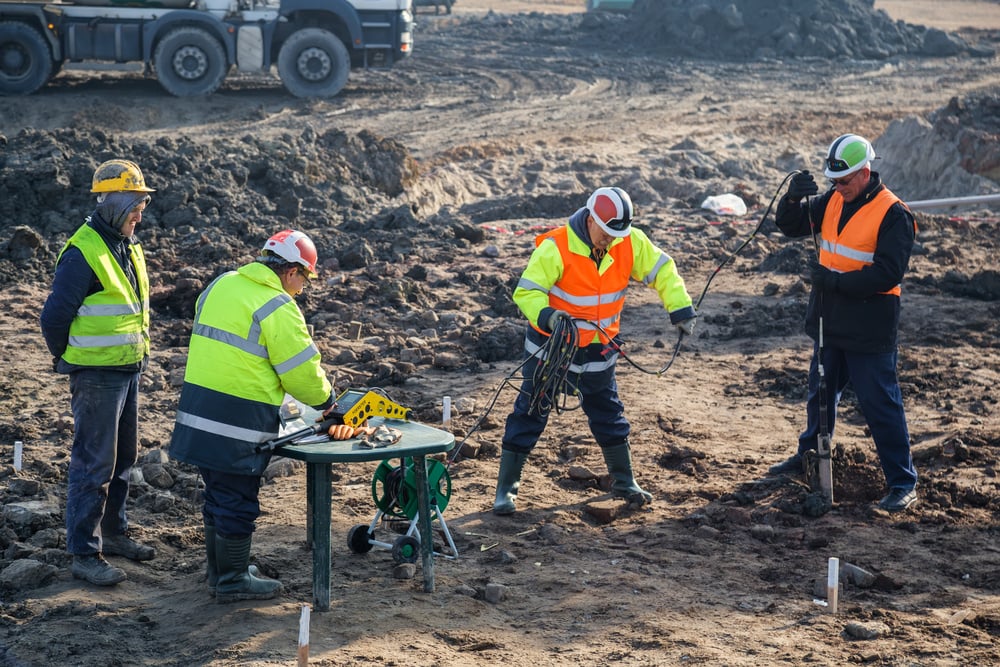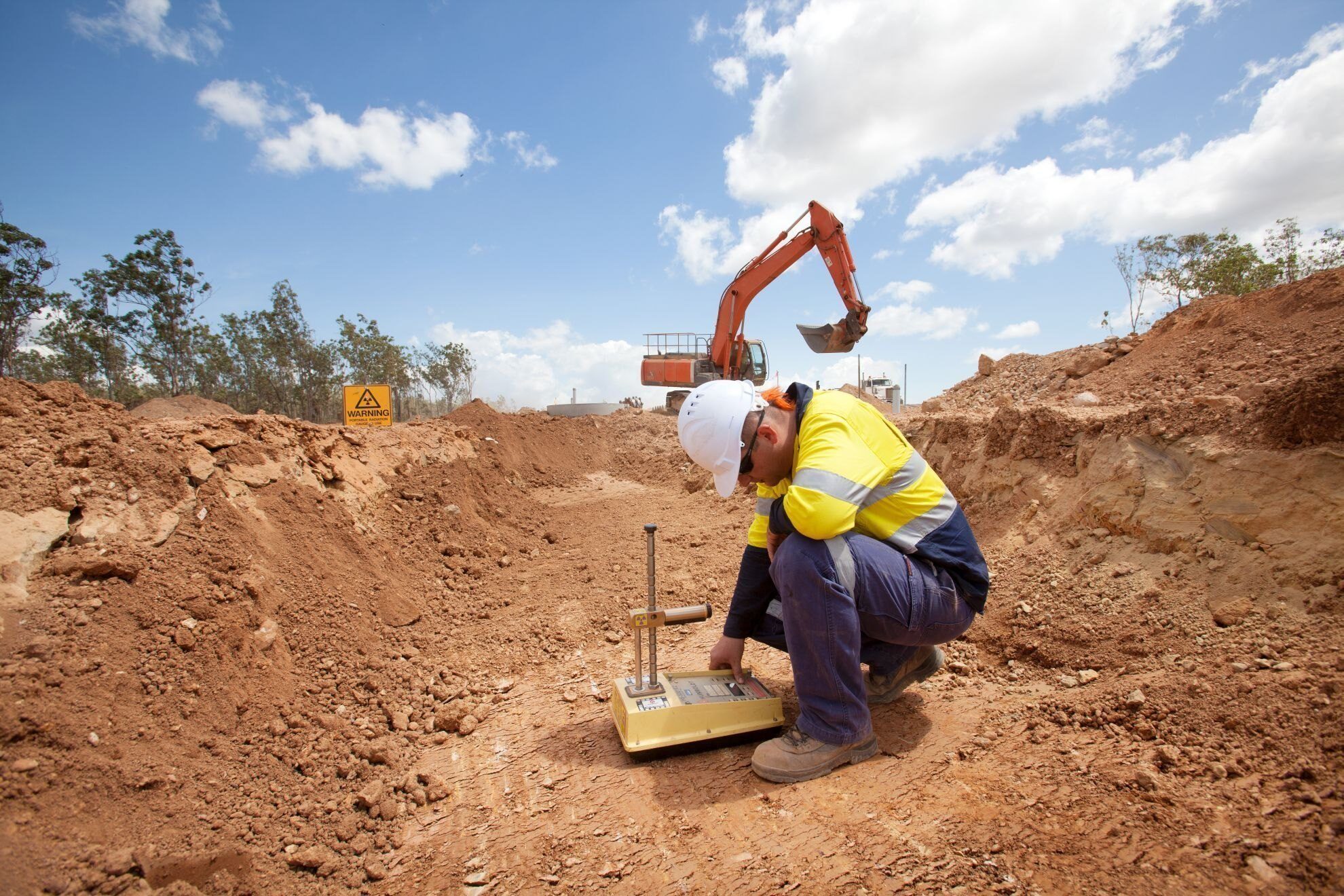Things about Specialized Geotechnical Engineering Solutions
Things about Specialized Geotechnical Engineering Solutions
Blog Article
Specialized Geotechnical Engineering Solutions Can Be Fun For Anyone
Table of ContentsSpecialized Geotechnical Engineering Solutions Can Be Fun For AnyoneSpecialized Geotechnical Engineering Solutions Things To Know Before You BuyGetting The Specialized Geotechnical Engineering Solutions To WorkSpecialized Geotechnical Engineering Solutions - Questions
They carry out website investigations, gather examples, execute research laboratory examinations, and assess information to examine the viability of the ground for building and construction tasks. Based on their findings, geotechnical engineers supply referrals for foundation style, slope stability, retaining frameworks, and mitigation of geotechnical risks. They team up with various other professionals, such as architects, structural engineers, and construction groups, to guarantee that geotechnical considerations are integrated right into the overall task style and application.
Structure Design: Geotechnical designers play a critical role in designing foundations that can securely sustain the desired structure. They examine the soil problems and tons needs to figure out the appropriate foundation kind, such as superficial structures (e.g., footings), deep foundations (e.g., piles), or specialized techniques like dirt enhancement. They consider elements such as settlement limitations, birthing capability, and soil-structure interaction to create ideal structure styles.
The Best Strategy To Use For Specialized Geotechnical Engineering Solutions
Right here are some types of geotechnical engineers: Structure Engineer: Foundation designers specialize in creating and analyzing foundations for frameworks - Specialized Geotechnical Engineering Solutions. They assess the soil problems, load demands, and website qualities to figure out one of the most suitable structure kind and design, such as shallow foundations, deep structures, or specialized strategies like pile foundations
They execute field testing, gather examples, and analyze the collected data to define the dirt homes, geologic developments, and groundwater problems at a website. Geotechnical Instrumentation Designer: Geotechnical instrumentation engineers concentrate on monitoring and determining the habits of dirt, rock, and frameworks. They mount and keep instrumentation systems that monitor elements such as soil settlement, groundwater levels, slope motions, and architectural variations to examine efficiency and provide early cautions of possible issues.
In the office atmosphere, geotechnical engineers use specialized software program devices to do estimations, develop layouts, and examine information. Specialized Geotechnical Engineering Solutions. They prepare records, evaluation job specifications, communicate with clients and employee, and coordinate task tasks. The office setting provides a conducive setting for research, analysis, and cooperation with various other experts included in the project
They frequently visit task websites to carry out site examinations, analyze geotechnical problems, and gather information for evaluation. These sees include traveling to various places, in some cases in remote or challenging surfaces. Geotechnical engineers may execute dirt sampling, conduct examinations, and screen construction tasks read what he said to make sure that the geotechnical aspects of the task are being carried out correctly.
Some Known Incorrect Statements About Specialized Geotechnical Engineering Solutions
Geotechnical designers also work in specialized geotechnical labs. Geotechnical lab designers function thoroughly in these settings, handling testing equipment, operating instruments, and tape-recording data.
Maintaining Wall surfaces: Developing wall surfaces that keep back dirt to avoid landslides and give stability on sloped terrains. Embankments and Earthworks: Designing embankments for roads, railways, and dams to ensure they remain stable under stress. The mining industry relies heavily on geotechnical engineering to ensure the safety and long life of its procedures.
With this in mind, we have actually made our program to prepare pupils for success. The Geotechnical Design program at the College of Delaware provides chances for advanced study and research in: Dirt and rock technicians Soil-structure communication Constitutive modeling Computational geomechanics Foundation and planet frameworks design Ground enhancement Slope security and landslide stablizing Liquefaction of soils and earthquake design Research laboratory characterization of look at here geomaterials and soil reinforcement Ecological geotechnics Provided the strong need for renovation to our country's infrastructurethe American Society of Civil Designers provided the united state
Geotechnical engineering is a branch of civil engineering; nonetheless, it includes utilizing scientific approaches and principles to collect and analyze the physical buildings of the ground. Geotechnical designers are involved in all stages of the layout of frameworks, from concept to building and construction. Their work is important in the layout and planning process as they examine the integrity of dirt, clay, silt, sand, and rock, prior to building and construction beginning.
Get This Report on Specialized Geotechnical Engineering Solutions
This is followed by a ground investigation based on the searchings for of the workdesk research and entails test matching and tasting to reveal any kind of possible concerns. Geotechnical designers work within multidisciplinary teams, supported by intermediate and junior engineers as well as by CAD technicians. As a senior geotechnical designer on a hydro plant task, jobs may consist of getting involved in technological testimonials (e.g., peer evaluations), tailings dam evaluations, dam security reviews, and other researches connected to the layout and building of mine waste facilities.
While some professionals are experts exclusively in geotechnics, others may work under titles like design rock hound or ground engineer within similar abilities. As a geotechnical designer, you'll need to: construct and keep connections with clients and various other specialists involved in the site, throughout each projectmaintain security criteria on website bear in mind expense ramifications when you make recommendationsstudy geological maps and aerial pictures from a series of resources and from different time periodsexamine building plans to see how practical they are based upon your understanding of the siteinvestigate threats or geological risks for the sitesearch for environmentally delicate attributes, such as landfill start to create factual and expository ground modelsplan area investigationsdrill and evaluate samples of bedrock, soil, groundwater and additional products supervise various other professionals on sitesolve technological issues as they emerge, such as unexpected frameworks at drill sitesmonitor conditions throughout and after construction to make certain structures are steady in the brief and long termadd information collected on site to your first researchcreate geotechnical calculations, illustrations, and 2 or three-dimensional computer designs interpreting the datamake suggestions concerning the proposed usage of the website.
There are lots of opportunities to satisfy new check this site out individuals, as you'll collaborate with a variety of professionals at every website. The work can be demanding as you may be accountable for the safety and security of others while on site. There is likewise a high degree of economic responsibility, as the suggestions you make can have significant price implications.

Report this page